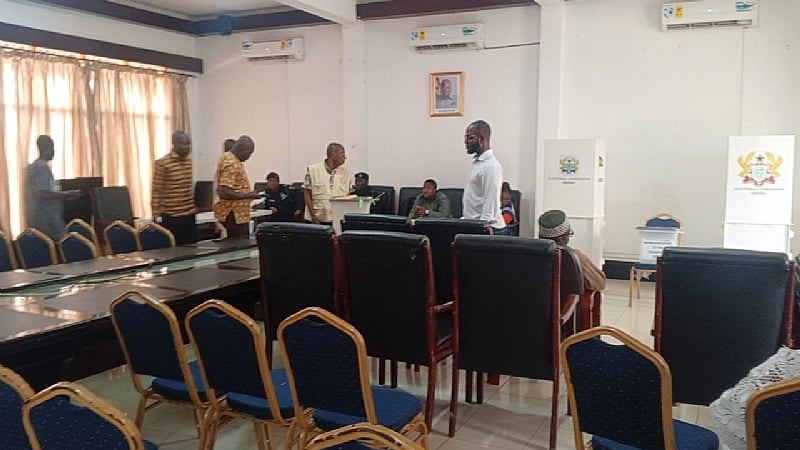The Central Region’s Council of State election, slated to commence at 7:00 am at the Regional Coordinating Council’s Banquet Hall, experienced an unexpected delay, leaving electoral officials bewildered and the outcome uncertain. Despite meticulous preparations by the Electoral Commission (EC), including setting up the voting venue and ensuring all logistical arrangements were in place, the delegates, the very individuals tasked with casting their votes, were conspicuously absent. This unusual circumstance generated an air of suspense and speculation as the clock ticked past the scheduled start time, transforming the anticipated election into a waiting game. The EC officials, ready and waiting, found themselves in the perplexing situation of having a fully prepared election venue devoid of the key participants – the electorate.
Mr. Manu Sakyi, the Regional Director of the EC, articulated the Commission’s surprise and concern. He emphasized that the EC had fulfilled its obligations, ensuring the venue was prepared and all necessary arrangements were finalized well before the stipulated start time. The unexpected absence of the delegates disrupted the planned schedule, which included a brief period for contestants to address the electoral college prior to the commencement of voting. Ironically, while the delegates remained elusive, the election room was occupied by representatives of the various contestants – agents and monitors – further highlighting the unusual nature of the delay. The empty voting booths and the presence of expectant observers created a striking image of an election stalled in its tracks, awaiting the arrival of the crucial players – the delegates.
As the morning progressed and the delay stretched on, the Ghana News Agency (GNA) observed some of the contestants engaging in last-minute lobbying efforts. These interactions took place away from the designated voting venue, suggesting a possible reason for the delegates’ delayed arrival. The candidates were seen conversing with delegates, presumably in an attempt to secure their votes in this crucial election. This impromptu off-site campaigning added another layer of intrigue to the already unusual situation, raising questions about the influence of these last-minute appeals on the eventual outcome. The image of candidates huddled with delegates away from the official venue painted a picture of behind-the-scenes maneuvering, underscoring the high stakes of this election.
The Central Region’s Council of State election is a significant event with implications for regional governance and representation. The Council of State plays a critical role in advising the President on key national issues. The election’s outcome hinges on the votes of a 44-member electoral college, comprising two representatives from each of the 22 assemblies within the region. This select group holds the power to determine the composition of the Council, making their participation crucial. The fact that these 44 individuals, entrusted with this important responsibility, were absent at the scheduled start time added to the growing sense of anticipation and uncertainty surrounding the election.
Ten candidates vying for a position on the Council of State, including Hannah Cudjoe, the only female contender, added to the complexity and competitiveness of the election. Each candidate represents different interests and perspectives, potentially leading to diverse policy recommendations and approaches to governance. The absence of the delegates delayed the process of choosing among these candidates, prolonging the suspense and leaving the outcome hanging in the balance. The eventual arrival of the delegates would not only initiate the voting process but also mark the beginning of the final stage in determining which of these ten individuals would secure a seat on the Council.
The delay in the Central Region’s Council of State election highlighted the unique nature of this electoral process, distinct from public elections. Unlike general elections where citizens cast their votes directly, Council of State members are elected indirectly through this electoral college system. The 44 delegates, representing their respective assemblies, hold the responsibility of choosing the individuals who will advise the President on matters of national importance. Their absence underscores the potential challenges associated with this system, where the participation of a relatively small group of individuals is critical to the entire electoral process. The delay served as a reminder of the crucial role played by these delegates and the potential for unforeseen circumstances to impact the smooth running of even carefully planned elections. As the day unfolded, the focus remained on the eventual arrival of the delegates, their voting decisions, and ultimately, the identity of the victorious candidate.


